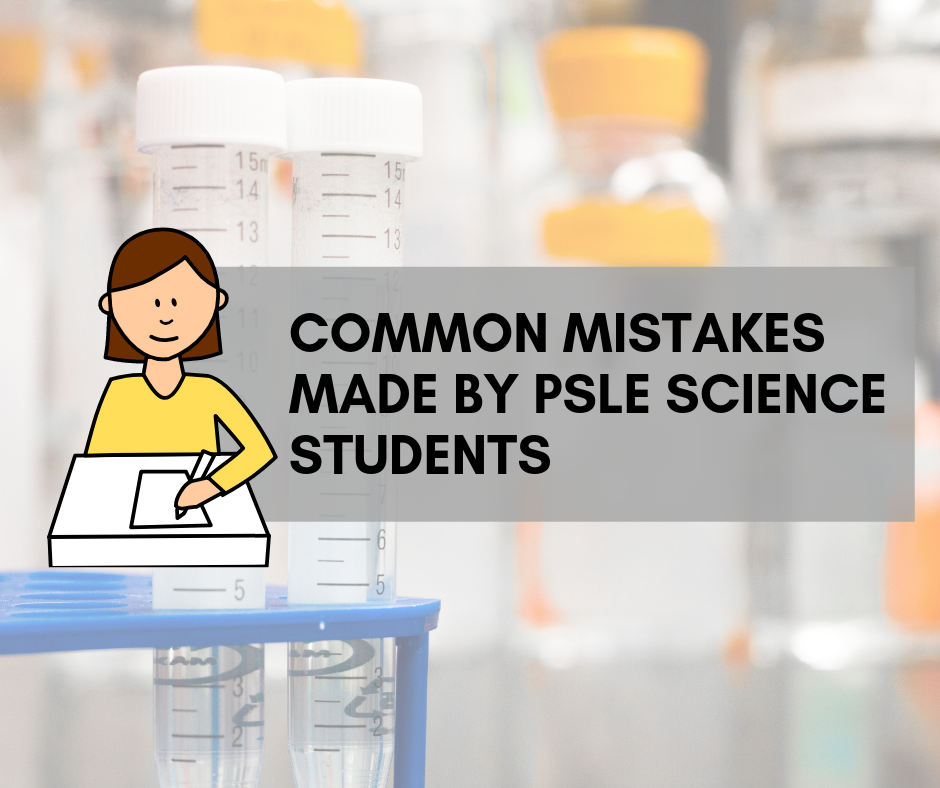What Is PSLE Science?
PSLE stands for Primary School Leaving Examination and it is a national examination in Singapore. It is taken by all Primary 6 students before moving on to secondary school. Students are introduced to the PSLE Science only after they have started Primary 3.
There are 4 compulsory subjects that every primary student has to take; English, Mathematics, Science and Mother Tongue. lets discuss some common mistakes that children make during their PSLE science examinations.
What is the trick to mastering PSLE science? To truly master it, children are expected to know how to apply the concepts and principles CORRECTLY.
Of course, to build that up, children will first need to remember and understand the concepts well. This builds not only their foundation of the subject, but their confidence as well.
To actually do well and stand out among the thousands of papers, your childs answers will have to be precise and detailed. In other words, knowing what the question is testing and applying the correct concepts and principles to it will be the difference.
As a parent, have you heard of the Bloom Taxonomy? The purpose of Bloom’s Taxonomy is to encourage higher order thinking in students by building up from lower-level cognitive skills. These are the 6 different levels as shown below.
To reach high level order thinking, mastering the ‘remember’ and ‘understand’ levels are fairly vital. Without a strong foundation, it can be a struggle to build critical thinking.
Tutopiya will break down the common mistakes that your child might make when they take their PSLE Science paper. As you read, think about how you can make an action plan to ensure your child avoids these mistakes.
Common PSLE Science Mistakes
Not Reading Questions Carefully
Science questions are usually lengthy to read and hard to grasp at the first read. Students often just quickly skim through the passage and just pick up few scientific words. Which they later assume that it is about a certain concept or topic.
This may cause students to misunderstand the question therefore applying the wrong concepts and principles.
What they should be doing instead:
Read the passage 2-3 times and make a scenario of what the passage is talking about. Pick out the specific keywords and analyze before they assume the topic or chapter the question is testing on.
Not Reading Answer Options Carefully
Not reading the options thoroughly and jumping into conclusion is also what causes children lose that mark! Some options are vague and may not be applicable to the question.
Should the question read:
Which of the following is/are characteristic(s) observed in all birds but not in other animals?
- Can fly
- Lay eggs
- Have feathers
- All of the above
Answer is 3. An Ostrich is a bird that cannot fly. Male birds do not lay eggs, only female birds do.
Careless mistakes like leaving out the word ‘not’ may also cause you to make ‘false’ for ‘true’ mistakes.
Insufficent Attention To Graphs, Diagrams or Tables
Quickly skimming through the options of several graphs, may also result in lost marks. Just because the shape of the graph looks like something they may have studied for, it may not be right. The axises may have changed or is wrong to beg
These 3 common mistakes that have been mentioned so far is all about the negligence of reading in detail
Using Incorrect Keywords
Children are often either vague or using the wrong keywords to explain a concept. By using the incorrect keywords or missing out keywords, markers may interpret your answers differently and take it as you did not grasp the concept properly.
Tips For Studying For PSLE Science
Start Enjoying It
Start enjoying the process of learning, understanding and knowing science. It could be hard for your child to enjoy it if they have no interest in the subject, they are also likely to be weak in it as well.
However, science can be made fun and they are likelyy to get the hang of it.
It needs to be taken one step at a time to make it fun. Building your childs interest for science can come in different forms.
Try exploring and exchanging science knowledge with your child, between their friends, study together and most importantly, have fun!
Do More Hands On
It is always more engaging when your child can go outdoors and understand the concepts by experiencing or seeing it. This helps your child to have a deeper understanding of what the concept is about.
Visual learning also helps your child to retain the memory and concept better in their head. On top of that, it improves their critical thinking. This occurs based on decisions made on what to do next to achieve a desired outcome. Your child will no longer need to memorize the steps and be able to apply the respective concept and principles immediately.
Try Being The Teacher!
Try making your child teach to you or their friends or simply, talk like a teacher.
This is more effective than taking a test as your childs brain will organise the information into a more logical and coherent structure. When they are tasked to teach, there is a higher likelihood that they will understand the concepts and principles better.
Stop Highlighting So Many Words
Teach your child to start highlighting smartly and stop highlighting redundant words like ‘the’ ‘as’ etc. Highlight all the scientific terms and make notes at the side. Break down the passages and interpret the sentences accordingly.
Over-highlighting may cause your to lose focus on the important keywords and cause you to answer the questions wrongly.
Not Using Correct Keywords And Techniques
“Explain” type questions are usually the ones that require your child to put on their thinking caps. These questions test your child ability to apply concepts and phrase them in a scientific manner. Therefore, when they fail to make use of the correct keywords and key phrasing, they may lose the point.
Students are also often vague in answering questions. An example is using ‘air’ instead of ‘oxygen’. Being specific allows markers to know that your child knows the concept well.
Start Early
Start revision early. This allows your child to identify their knowledge gaps early and address them quickly. Refrain from piling them up. This is because some chapters and topics are linked, they may struggle to move on to the next related chapter if their foundation is not strong.
Not only so, they can plan ahead and have sufficient time to study all the materials. Some topics or subjects may require more of your attention.

Rest
The night before their PSLE science examinations, REST. YThey will need the rest. It will be too late to cram all the content and sacrificing your sleep for it. Our brains are at their best when they are well rested.

You also can refer to an infographic that Tutopiya made, that provides an overview of Exam and Revision Tips that is applicable to any subjects.

Tutopiya has also written similar articles, check out how the ultimate guide to Singapore Primary SA1 examinations here!
About Tutopiya
Tutopiya is live online tuition agency based in Singapore offering online online tuition for students in Singapore & across the globe. Tutopiya offers 1-1 individual and personalised lesson for you child. Our tutors are also highly qualified subject specialists and always ready to tutor you. Sign up for a FREE trial lesson.

